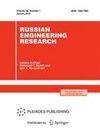激光喷丸成形关键参数对板材弯曲的影响
Q3 Engineering
引用次数: 0
摘要
摘要 本研究考虑了激光点焊成形(LPF),它涉及薄板在冲击波作用下的变形。采用有限元法对 LPF 过程进行了模拟。结果表明,通过调整激光光斑重叠率、激光脉冲重复次数和激光束功率密度,可以获得最大的板材弯曲曲率。本文章由计算机程序翻译,如有差异,请以英文原文为准。

Influence of Key Parameters of Laser Peen Forming on Plate Bending
Abstract
The study considers laser peen forming (LPF), which involves deformation of a thin plate by a shock wave. The LPF process is simulated using the finite element method. It is established that the maximum plate bending curvature can be achieved by adjusting the laser spot overlap ratio, the number of laser pulse repetitions, and laser beam power density.
求助全文
通过发布文献求助,成功后即可免费获取论文全文。
去求助
来源期刊

Russian Engineering Research
Engineering-Industrial and Manufacturing Engineering
CiteScore
1.20
自引率
0.00%
发文量
226
期刊介绍:
Russian Engineering Research is a journal that publishes articles on mechanical and production engineering. The journal covers the development of different branches of mechanical engineering, new technologies, and tools for machine and materials design. Emphasis is on operations research and production-line layout, industrial robots and manipulators, quality control and process engineering, kinematic analysis of machine assemblies, and computerized integrated manufacturing systems.
 求助内容:
求助内容: 应助结果提醒方式:
应助结果提醒方式:


